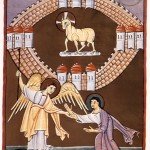 In this article I just began sharing thoughts about the last book of the New Testament, Revelation. It cannot be adequately comprehended except against the historical background which occasioned its writing. Like the Book of Daniel and other apocalypses, it was composed as resistance literature to meet a crisis. The book itself suggests that the crisis was ruthless persecution of the early church by the Roman authorities; the harlot Babylon symbolizes pagan Rome, the city on seven hills. The book is, then, an exhortation and admonition to the Christian to stand firm in the faith and to avoid compromise with paganism, despite the threat of adversity and martyrdom; he is to await patiently the fulfillment of God’s mighty promises. The triumph of God in the world of men remains a mystery, to be accepted in faith and longed for in hope. It is a triumph that unfolded in the history of Nazareth, and continues to unfold in the history of the individual Christian who follows the way of the cross, even, if necessary, to a martyr’s death.
In this article I just began sharing thoughts about the last book of the New Testament, Revelation. It cannot be adequately comprehended except against the historical background which occasioned its writing. Like the Book of Daniel and other apocalypses, it was composed as resistance literature to meet a crisis. The book itself suggests that the crisis was ruthless persecution of the early church by the Roman authorities; the harlot Babylon symbolizes pagan Rome, the city on seven hills. The book is, then, an exhortation and admonition to the Christian to stand firm in the faith and to avoid compromise with paganism, despite the threat of adversity and martyrdom; he is to await patiently the fulfillment of God’s mighty promises. The triumph of God in the world of men remains a mystery, to be accepted in faith and longed for in hope. It is a triumph that unfolded in the history of Nazareth, and continues to unfold in the history of the individual Christian who follows the way of the cross, even, if necessary, to a martyr’s death.
Though the perspective of the work is eschatological – ultimate salvation and victory are said to take place at the end of the present age when Christ will come in glory at the Parousia – the book presents the decisive struggle of Christ and his followers against Satan and his cohorts as already over. Christ’s overwhelming defeat of the kingdom of Satan has ushered in the everlasting reign of God. Even the forces of evil unwittingly carry out the divine plan, for God is the sovereign Lord of history.
The Book had its origin in a time of crisis, but it remains valid for Christians of all time. In the face of evils from within and without, the Christian can confidently trust in God’s promise to be with the church forever.
The author identifies himself as John. For much of Christian history, it was taken for granted that he was the same John who wrote the gospel and letters of John and who was one of the twelve disciples of Jesus. Modern scholarship does not think so. Indeed, the author does not claim to be one of the twelve apostles. In fact he refers to them as revered figures of the past. Moreover, John was a common Jewish name and there are several Johns in the New Testament.
